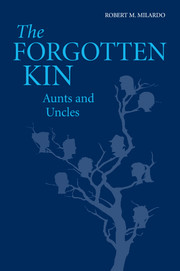Book contents
5 - Mentoring
Published online by Cambridge University Press: 20 January 2010
Summary
In this and the next two chapters, I explore the appearance of generativity in the relationships of aunts and uncles with nieces and nephews. Mentoring and intergenerational buffering are two primary requirements of generative cultures, and in this chapter, I examine how and when they emerge in families. Although generativity is often viewed as an individual attribute appearing in the midlife development of adults, as we shall see, it is enacted in a relational context involving parents, their children, and extended kin. Viewed in this way, mentoring and intergenerational buffering are akin to active thoroughfares with a good deal of bus traffic passing within and across generations, rather than individual conveyances passing along one-way avenues. To be sure, aunts and uncles actively mentor their nieces and nephews. In addition, they actively mentor parents and in this way further secure their importance in building generative family cultures. Then again, relationships are negotiated enterprises, even those involving older adults and younger children. Just as offspring can influence the development of their parents, nieces and nephews influence the development of their kinfolk, and they do so by actively mentoring their aunts and uncles. These generative thoroughfares have been largely unexplored to date, although they are clearly central and active.
Aunts and uncles actively mentor nieces and nephews in a variety of ways. They are valued for their support, counsel, and occasional criticism in matters of school and career, spirituality and moral values, and relations with parents, siblings, and other family members.
- Type
- Chapter
- Information
- The Forgotten KinAunts and Uncles, pp. 101 - 130Publisher: Cambridge University PressPrint publication year: 2009



